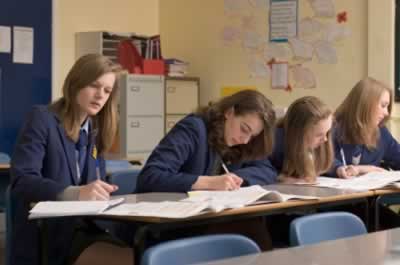(单词翻译:单击)
情景对话
I've been at boarding school since the age of 8, which is pretty young if you think about it. The reason I went there was because my family were living abroad and they thought it would probably be better for me to go to school in England. It was really fun actually. At sort of 8 to 13, my first school, I had a great time. I loved it. I hardly ever missed my parents. We had so much to do. This school was great. They organized all these things for us to do. Obviously we were there over the weekend. Some of the kids went home at the weekend. Some of the kids went home everyday but us that had to stay over the weekend, we always had like loads of stuff to do. There were rules obviously, but we were given a pretty free hand within the sort of school grounds. We were left to do our own thing. We had our own like common areas. We could bring in our music, we could, it was, you know, it was great and sort of the only bad memory I really have of that is having to say goodbye to my parents all the way in Holland where we lived and I would have to say goodbye to them at the end at the airport and then fly over by myself to England and get picked up by an aunt and taken to school which was, that was the only sort of thing I can remember that was bad about it, but obviously as you get older, and I moved on to my secondary school, what we call it in England, yeah, I started to like it less and less, obviously as you get older, you sort of get more opinions about things, about people, how people should be, brought up, about the sort of freedom you should be given, especially from the ages of maybe 13 to 16. You're very opinionated and think you know best, but the school I went to was very rules orientated. It was very strict, and yeah, as sort of other people of a similar age to me, started going out, you know to clubs, going out to pubs, and doing what kids normally of that age do, we were stuck at school and had to bed at like quarter past 10 on a Saturday night, which I think for a 17, 18 year old kid is pretty unnatural. It's not a very sort of, I mean at that age I don't think it's a natural environment for children to be in. When I say children, you're not really a child anymore at that age. You should be learning to, you know, cook for yourself, wash your own clothes, look after yourself, but of course all of this is done for you at school. However, I have to say now, now that I'm living in a different country at the moment. I'm living in Japan away from all my friends, away from my family, and it really isn't a problem for me at all. I sort of just slipped into life here very easily cause I so used to living alone.
我从8岁开始上寄宿学校,如果你考虑一下的话,那真的是非常小的年纪。我去寄宿学校的原因是我家人都住在外国,他们认为我在英国上学比较好。实际上这很有趣。8岁到13岁时,我在第一所学校过得非常开心。我很少想念父母。我们在学校里有很多事情做。这所学校非常棒。他们会为我们组织所有的事情。显然我们周末也会在学校里。一些孩子会在周末回家。也有些孩子每天都回家,但是我们周末也必须待在学校里,我们有大量的事情要做。显然学校有规定,不过我们也得到允许可以在校园里自由行动。他们会让我们自己做事情。我们有自己的公共区域。我们可以演奏音乐,你知道,那很好,唯一的糟糕记忆就是在荷兰和父母分别,我们住在荷兰,我不得不在机场和父母分别,然后独自飞往英国,一个阿姨会去英国机场接我然后把我送去学校,那就是我记得的唯一不好的事情,不过显然,随着年龄逐渐长大,我升上了初中,这是我们在英国的说法,我变得越来越不喜欢学校,在渐渐长大以后,你对事情、人们会有更多的想法,人们应该如何长大,还有应该获得的自由,对这些都会有自己的看法,尤其是在13岁到16岁时想法特别强烈。这时你会固执己见,而且认为你最了解某件事情,但是我上的那所中学有严格的规定,跟我年龄相仿的同学开始出去玩,他们会去俱乐部,酒吧,做些那个年龄的孩子通常会做的事情,而我们即被关在学校里,周六晚上9点40必须上床睡觉,我想这个规定对17、8岁的孩子来说非常不正常。在那个年龄时我认为那并不是孩子们的自然环境。在那个年纪已经不再是孩子了。你应该学会自己做饭,自己洗衣服,自己照顾自己,但是当然,所有这些事情学校都会帮学生们完成。我得说,现在我住在一个完全不同的国家,我生活在日本,远离所有的朋友,远离家人,可是这对我来说完全不是问题。我很容易就适应了这里的生活,因为我已经习惯一个人生活了。

重点讲解
重点讲解:
1. hardly ever
几乎不;几乎没有;
eg. We ate chips every night, but hardly ever had fish.
我们每晚吃炸薯条,但几乎从不吃鱼。
eg. I have hardly ever been out of this city.
我几乎未曾离开过这个城市。
2. give sb. a free hand
自行决定权;自由行动权;
eg. He gave Stephanie a free hand in the decoration.
他放手让斯蒂芬妮全权负责装修一事。
eg. He was inclined to give them a free hand.
他倾向于放手让他们干。
3. be left to do sth.
是leave sb. to do sth.的被动式,表示听任(某人做某事);听(某人)自便;
eg. One of the advantages of a department store is that you are left to yourself to try things on.
逛百货公司的其中一个优势是顾客可自行试穿衣服。
eg. He can be left to work on his own.
工作可交给他一个人去做。
4. say goodbye to
道别;
eg. He wanted to say goodbye to you.
他想跟你说声再见。
eg. We went on holiday at such short notice that I didn't say goodbye to Eric.
我们动身去休假之前十分仓促,我来不及向埃里克告别。
5. bring up
养育;抚养;养大;
eg. She brought up four children.
她养大了4个孩子。
eg.His grandmother and his father brought him up.
是他的祖母和父亲把他养大的。
6. used to doing sth.
习惯做某事;
eg. I'm not used to eating so much at lunchtime.
我不习惯午饭吃那么多。
eg. She was used to having her orders instantly obeyed.
她习惯了让人即刻服从她的命令。


